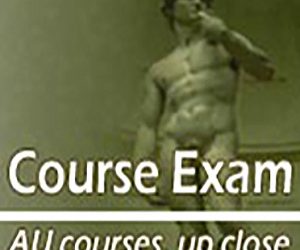 MUSI 268 / HUMN 268 (Classical Music: A Historical Introduction) is a three-credit introductory music course that aims to review the fundamental elements of music as art in Western civilization. Students will first get a good grasp of the key elements of music. It is important to become comfortable with the meaning and use of the musical vocabulary that is introduced in this course. There are no prerequisites for MUSI 268 / HUMN 268 and there is a Challenge for Credit option if students are interested.
MUSI 268 / HUMN 268 (Classical Music: A Historical Introduction) is a three-credit introductory music course that aims to review the fundamental elements of music as art in Western civilization. Students will first get a good grasp of the key elements of music. It is important to become comfortable with the meaning and use of the musical vocabulary that is introduced in this course. There are no prerequisites for MUSI 268 / HUMN 268 and there is a Challenge for Credit option if students are interested.
Students should note that MUSI 268 is a cross-listed course, meaning that it is a course that is also listed under a different discipline as HUMN 268. MUSI 268 may not be taken for credit by students who have obtained credit for HUMN 268 or HUMN 269.
Classical Music: A Historical Introduction is divided into fifteen units, with fifteen discussion board postings worth a total of fifteen percent, fifteen self-tests totalling fifteen percent, one short essay worth twenty percent, one long essay that weighs twenty-five percent, and a final examination weighing twenty-five percent. The fifteen units within this course cover a large amount of information including late romanticism, medieval music, music in the renaissance era, opera in the nineteenth century, the classical period, musical nationalism, and so much more. In order for students to receive credit for MUSI 268 / HUMN 268, you must complete and submit all of the five components listed above. Also, students must achieve a course composite mark of at least a “D” which is equivalent to fifty percent, and obtain a minimum of fifty per cent on the final examination.
Dr. Kevin Whittingham has been the tutor for MUSI 268 / HUMN 268 since its opening and has been with Athabasca University for decades. Alongside this course, he tutors MUSI 267 (Sound and Sense: Listening to Music), HIST 201 / HUMN 201 (Western Thought and Culture I: Before the Reformation), HIST 312 / HUMN 312 (Ancient Rome), HIST 313 / HUMN 313 / RELS 313 (Early Christians), and HIST 404 (Historical Foundations of Modern Science). He provides a brief introduction, stating “I have a master’s degree in humanities and a doctoral degree in musicology.”
Furthermore, as stated in his biography, “In long service as a tutor, Kevin has had experience in a wide range of courses in history, humanities, and music. He has contributed to the development of MUSI 267, HUMN 268 and 269, HIST/MUSI 310, and HUMN/CLST/MUSI 412. He is a member of The British Music Society, The English Poetry and Song Society, The Housman Society, and The International Association for Word and Music Studies. His published articles concentrate on vocal music, and he is currently researching the early twentieth-century British contralto Clara Butt.”
When asked to describe the course to students, he states “The course begins with a review of the fundamentals of Western art music and its vocabulary. It covers the period from Gregorian chant to the late twentieth century.”
As for the structure of the course, Dr. Whittingham states “The course is online. It requires extensive reading and listening, two essay assignments, forum posts, self-tests, and one invigilated exam.”
He provides some advice for MUSI 268 / HUMN 268 students, stating that to be successful in the course “they must have the commitment to follow a suggested study schedule. Students should also contact their tutor about each essay assignment when you they are about to start it. Make sure to apply any feedback that you received on the first essay to the second.”
Dr. Kevin Whittingham recommends this course to any “Students with an interest in ‘classical’ music.”
As for what he believes students will take away from MUSI 268 / HUMN 268, he states “An overview of the history of Western art music and familiarity with its sounds.”
When asked to describe which aspects of the course seem to be the most difficult for students, he explains that students may have difficulties with the necessary “Online library research and critical reading of secondary sources. Also, parts of the exam require short answers to specific questions. Students need to be aware that focused reading of the course materials and memorization are necessary.”
Whether MUSI 268 / HUMN 268 is a degree or program requirement of yours, or if the topics or musical genre that is discussed above is of interest to you, this course will have you learning a lot of interesting material surrounding the subject of classical music. If you would like to get in contact with Dr. Kevin Whittingham, his email is kevinw@athabascau.ca.


